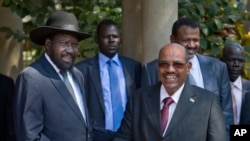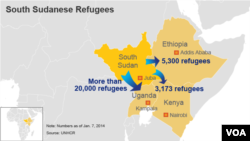Sudan Minister of Information Ahmed Bilal said President Omar al-Bashir and his South Sudanese counterpart, Salva Kiir, did not agree to establish a joint military force to protect oil fields.
Bashir’s foreign minister, Ali Ahmed Karti, was quoted as saying the two leaders were “in consultations about the deployment of a mixed force to protect southern oilfields.”
But Bilal said the two leaders agreed during Bashir’s visit to South Sudan Monday to send 900 Sudanese oil experts to South Sudan to help with the recovery of oil production lost as a result of the ongoing conflict.
Bilal said Khartoum and Juba agreed long before the conflict began to deploy joint forces along their shared border to prevent rebels from crossing into either country.
He said Khartoum will not unilaterally take part in the conflict unless called upon by the African Union to send troops as part of an overall African peacekeeping mission.
Bilal said Bashir assured Kiir that South Sudan refugees crossing into Sudan would be cared for.
“Bashir told his brother [President] Salva Kiir that the refugees who are coming to Sudan will not be considered as refugees, but will be considered as citizens. And they can go everywhere in Sudan as they like, and we will give them all possible help to settle [them] at least [until] this conflict is over,” he said.
Bilal said the two leaders also agreed to send 900 Sudanese oil experts to South Sudan to help with the recovery of oil production lost to the ongoing conflict.
He said Khartoum and Juba agreed long before the conflict broke out in mid-December to deploy troops to patrol along their shared border to prevent rebels from crossing into either country.
“Actually, he said the joint troops will be on the border, and this is a prior agreement before even this war started. We have an agreement saying that we have to deploy joint troops along the borders and this is what we are going to do, but not any sort of joint troops to fight or to participate in the war,” Bilal said.
Bilal said Khartoum will not take part in South Sudan's conflict..
“We will not unless, of course, the Peace Council in the AU [African Union] considers it and decided to send troops. But now, separately, we will not send troops to the South,” Bilal said.
Bashir’s foreign minister, Ali Ahmed Karti, was quoted as saying the two leaders were “in consultations about the deployment of a mixed force to protect southern oilfields.”
But Bilal said the two leaders agreed during Bashir’s visit to South Sudan Monday to send 900 Sudanese oil experts to South Sudan to help with the recovery of oil production lost as a result of the ongoing conflict.
Bilal said Khartoum and Juba agreed long before the conflict began to deploy joint forces along their shared border to prevent rebels from crossing into either country.
He said Khartoum will not unilaterally take part in the conflict unless called upon by the African Union to send troops as part of an overall African peacekeeping mission.
Bilal said Bashir assured Kiir that South Sudan refugees crossing into Sudan would be cared for.
“Bashir told his brother [President] Salva Kiir that the refugees who are coming to Sudan will not be considered as refugees, but will be considered as citizens. And they can go everywhere in Sudan as they like, and we will give them all possible help to settle [them] at least [until] this conflict is over,” he said.
Bilal said the two leaders also agreed to send 900 Sudanese oil experts to South Sudan to help with the recovery of oil production lost to the ongoing conflict.
He said Khartoum and Juba agreed long before the conflict broke out in mid-December to deploy troops to patrol along their shared border to prevent rebels from crossing into either country.
“Actually, he said the joint troops will be on the border, and this is a prior agreement before even this war started. We have an agreement saying that we have to deploy joint troops along the borders and this is what we are going to do, but not any sort of joint troops to fight or to participate in the war,” Bilal said.
Bilal said Khartoum will not take part in South Sudan's conflict..
“We will not unless, of course, the Peace Council in the AU [African Union] considers it and decided to send troops. But now, separately, we will not send troops to the South,” Bilal said.







